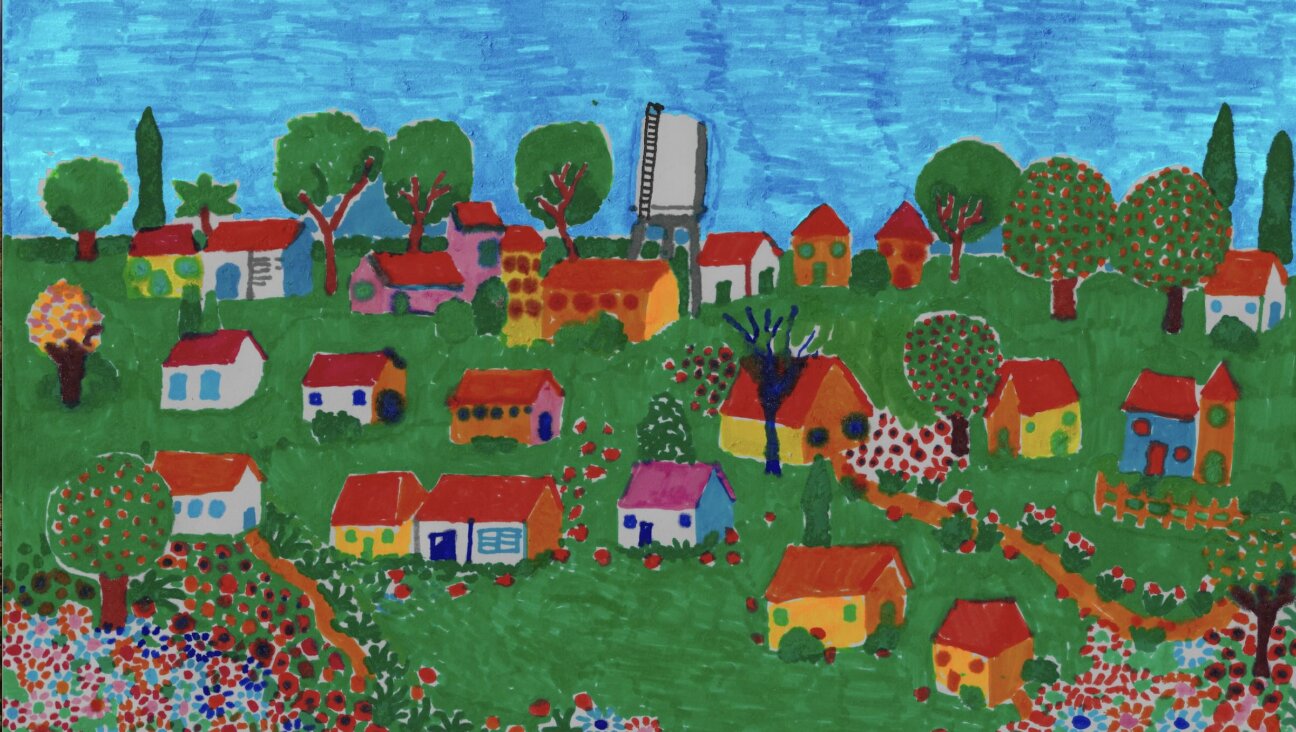When Kindness Counts, a Dinner To Say Thanks

?Angels?: From left, Clara Shore, a L?Chaim member, and co-chairs Marsha Urowitz and Elizabeth Erlich. Urowitz was a phone buddy for a year with Rivka Rita Ittleman after she was diagnosed with breast cancer. Image by JEREMY MELNICK, ToRoNTo
The buffet dinner hummed with a festive air: plates of fragrant chicken; amiable chatter; little gifts of scented soap and candles, opened with unrestrained glee.
But then things turned quiet, and serious, when Rivka Rita Ittleman stepped forward to thank her guests — “my angels.” Circling the room, she named the 20 women, one by one, pausing to single out the contribution each had made to her postoperative recovery from breast cancer. Collectively, their long arm of help had driven her to medical appointments, prepared her meals and even cleaned up after her two goldendoodle dogs, Buddy 8, and Lady 4, in snow and ice.
Ittleman, 59, emerged from the blur of those grueling months wanting to acknowledge, in a special way, these women “who brought light to my life.” With a friend’s gracious offer to cook and host, she warmed to the idea of having a seudat hoda’ah, a meal of thanksgiving, traditional in Judaism following the survival of a serious illness or trauma.
Indeed, Toronto’s L’Chaim Cancer Support Group for Jewish Women, where Ittleman turned for the encouragement of a phone buddy after her diagnosis, is aware of others who have marked the end of their cancer treatment with a seudah.
“It’s something to look forward to, to hold on to,” said Elizabeth Erlich, 58, who co-founded L’Chaim in 1999 with Marci Tenenbaum, of the event. “You take every single act of kindness into the treatment room and never feel like you’re going in there alone. You really want to thank the people who did so much for you.”
Every seudah has its own personality, from in-home small gatherings to larger venues appropriate for a crowd. And the heartfelt gratitude that runs throughout is expressed in various ways: prayers, speeches, charitable donations made in honor of every guest.
“We laughed, we cried. You could feel something in the room. It was uplifting, something I’ll never forget,” Ittleman recalled.
Delighted with that cold winter day’s turnout, which included her L’Chaim phone buddy, Ittleman took the opportunity to allude to the mitzvah of visiting the sick. But she also tapped into a playful side, tucking personalized notes into gifts of oversized pink polka dot coffee mugs and saucers.
Women who have drawn on the seudah tradition describe it as “meaningful,” said Erlich, echoing that sentiment from her own seudah, more than a decade ago.
She and her husband, Robert, chose a kosher restaurant to accommodate their 60 guests — family, friends and neighbors, all of whom rallied like first responders when the call went out that a mother with cancer and her four young children needed help.
People cooked and carpooled, took the kids skating and invited the family for Sabbath meals when Erlich was laid up by chemotherapy. There were times when the doorbell rang she would find plates of home-baked cookies from women she didn’t even know.
“Seeing someone through cancer treatment is a communal effort,” she said, “but each act of kindness gave me strength.”
That energy is a priceless benefit that flows from L’Chaim’s mission of dispensing help and information for the diverse but specific needs of Jewish women with cancer.
In addition to identifying local resources for cancer patients, L’Chaim broadens its scope with material of special interest to Jewish women. That includes “What Every Jewish Woman Should Know About Cancer,” a L’Chaim-produced DVD about genetic testing for certain cancer-causing genes more common in Jewish women.
Since its beginnings, 11 years ago, L’Chaim has welcomed women from all movements of Judaism to seek out its network of cancer-survivor volunteers, to take part in its educational programming, or to relax in its art therapy and music sessions for those more inclined to jazz and klezmer.
L’Chaim’s success has spawned a similar group in Edmonton, Alberta, and the Toronto section of the National Council of Jewish Women of Canada has now taken the organization under its wing.
L’Chaim can be reached at [email protected] or at 416-630-0203.
Dorothy Lipovenko is a writer living in Montreal.
A message from our Publisher & CEO Rachel Fishman Feddersen

I hope you appreciated this article. Before you go, I’d like to ask you to please support the Forward’s award-winning, nonprofit journalism during this critical time.
We’ve set a goal to raise $260,000 by December 31. That’s an ambitious goal, but one that will give us the resources we need to invest in the high quality news, opinion, analysis and cultural coverage that isn’t available anywhere else.
If you feel inspired to make an impact, now is the time to give something back. Join us as a member at your most generous level.
— Rachel Fishman Feddersen, Publisher and CEO























